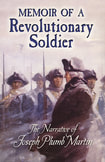
Concerning Hale, Martin notes that he was executed as a spy on Long Island, in 1776, "without shadow of a trial; denying him the use of a Bible or the assistance of a clergyman in his last moments, and destroying the letters he had written to his widowed mother and other relations.
André, on the other hand and according to Martin, was brought to headquarters, "where he was examined, condemned and executed". He continues: "He was an interesting character. There has been a great deal said about him, but he was but a man, and no better, nor had he better qualifications than the brave Captain Hale, whom the British commander caused to be executed as a spy." He reports that André was afforded "every indulgence allowed him that could be granted with propriety".
Martin closes the book on the matter with a harsh, "[L]et all who pity André so much, look at it and be silent."
Reading the quick account from a soldier who himself laid eyes on André is chilling. With some four years separating the two executions, much had changed in the war. With some 240 years passing between then and now, it is interesting to consider the decisions that were made so long ago.
As Joseph Plumb Martin notices, each "but a man, and no better". That includes the lowest private to the highest general. I continue to discover that even the men and women we regard as our heroes are greatly flawed and make mistakes, and I cannot imagine the torments they must have experienced that caused history to unfold in just the manner that it did. We do well to recognize that the same is true of today's leaders and citizens are faced with the same hard choices. They, too, deserve our patience and support to make the best ones for our time.







































